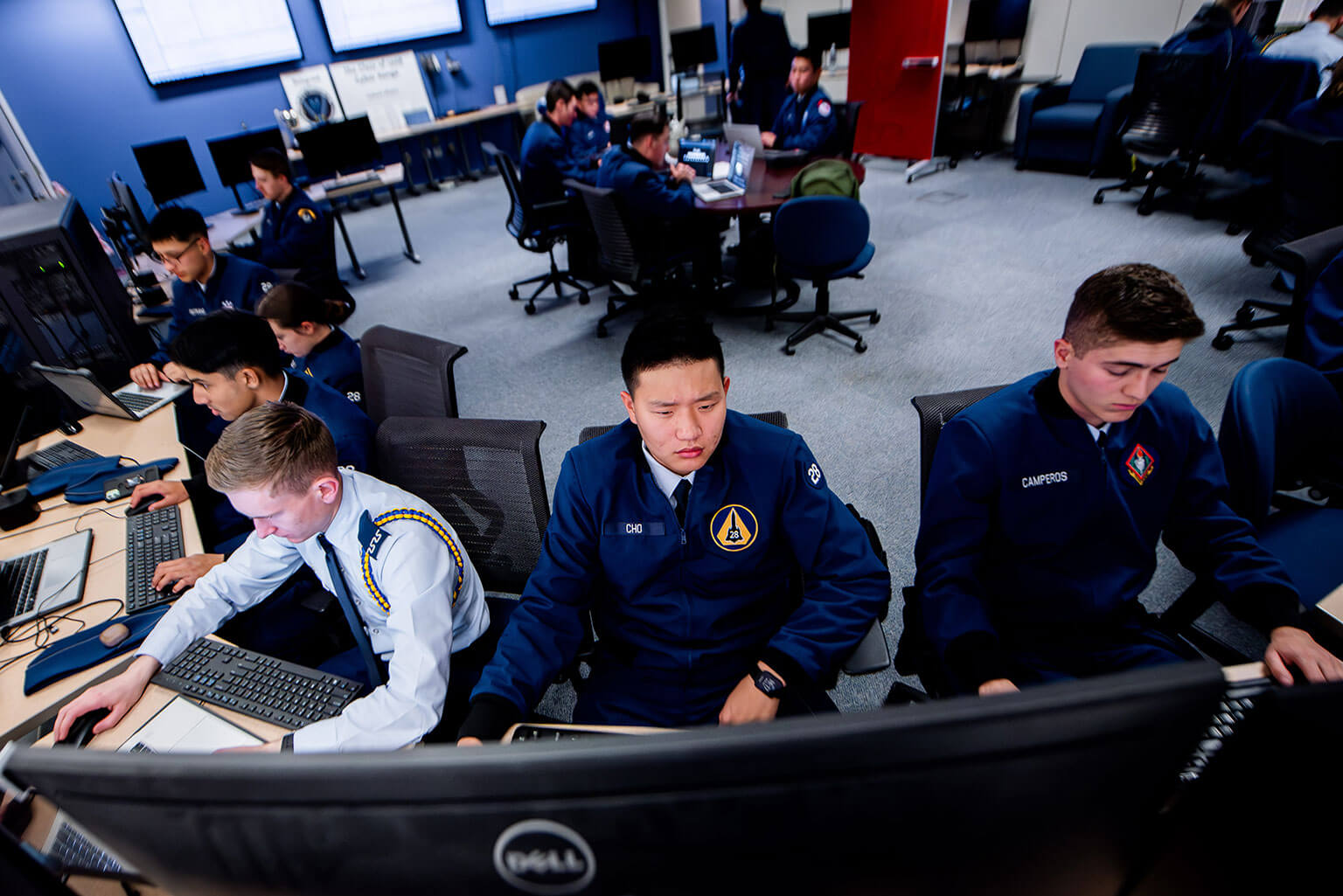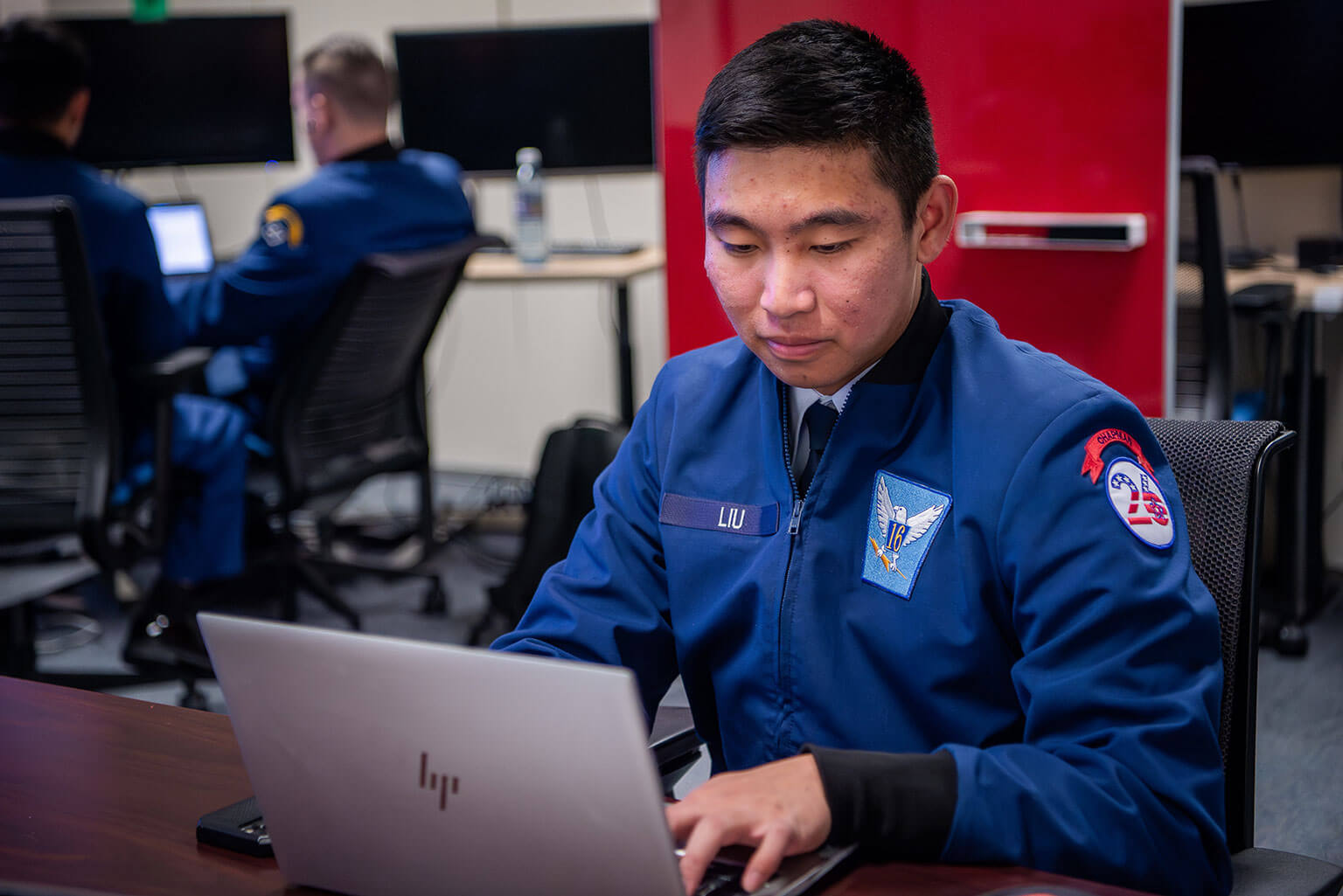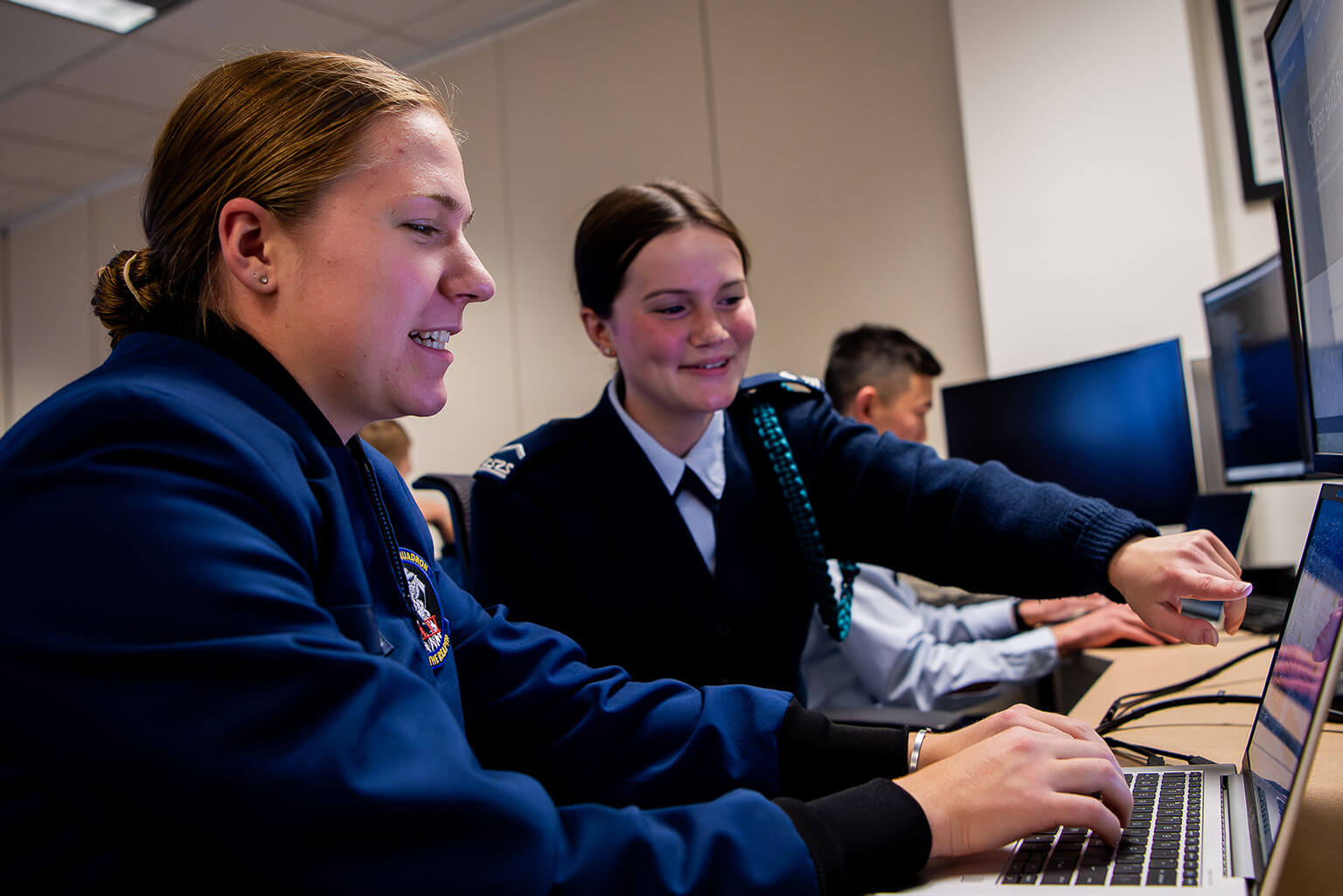Cyber Warfare Club: developing digital warriors

Cyber Warfare Club Cadets 4th Class Gabriel Cho, middle, and Nicholas Camperos hone their skills in performing exploitations and securing networks in the U.S. Air Force Academy Cyber Warfare Training Range in Fairchild Hall Nov. 20, 2024. The club equips cadets with the experience and skills they will need to face cyber conflicts as officers. (U.S. Air Force photo by Justin Pacheco)
By Randy Roughton
U.S. Air Force Academy Strategic Communications
U.S. AIR FORCE ACADEMY, Colo. – Cyber Warfare Club members meet regularly to develop and hone their skills in preparation to become the nation’s next generation of digital warriors. The club provides cadets with opportunities to learn in-demand cyber skills through competitive learning.
Cadets receive hands-on experience in disturbing, attacking and defending within simulated digital environments. Their club experiences complement an Academy curriculum that emphasizes ethical decision-making, leadership development and technical expertise. Club members learn to lead teams in complex, high-stakes environments. This is an important skill for future cyber officers, said Cadet 2nd Class Jaden Liu, a Cyber Science major and the team’s cadet-in-charge.
“The Cyber Warfare Club can train cadets with no experience to become cyber operators at the most elite levels of collegiate and professional competition,” Liu said. “By doing that, we are preparing the future cyber operators for the U.S. Air Force and U.S. Space Force while representing the Academy in competition.”

Cadet 2nd Class Jaden Liu, U.S. Air Force Academy Cyber Warfare Club cadet-in-charge, addresses a challenge in the Cyber Warfare Training Range in Fairchild Hall Nov. 20, 2024. Club experiences complement an Academy curriculum that emphasizes ethical decision-making, leadership development and technical expertise. (U.S. Air Force photo by Justin Pacheco)
Developing offensive and defensive cyber skills
Cadets learn technical skills such as malware analysis, network security and penetration testing. Additionally, they perform binary and web exploitations, forensics and cryptography. The club also has a team that drafts cyber policy and incident response for competitions they will present to a hypothetical national security council.
Members from all classes and majors with varying experience levels gain cutting-edge skills and the mindset to face the continually evolving challenges of cybersecurity and cyber warfare. Cadets in all classes and majors can join the club with no experience required. After graduation, some club members complete graduate school at institutions such as the Air Force Institute of Technology and Massachusetts Institute of Technology. Upon graduation, those selected for positions in the cyber field can lead cyber protection and offensive units.
A history of excellence in competition
The club’s primary focus is competition. Regular participation in national and international cyber competitions challenges club members to protect and defend simulated networks against professional-grade threats. They participate in more than 30 competitions and events annually, such as capture-the-flag and attack/defense competitions.
The Academy’s Cyber Warfare Club won the National Security Agency Cyber Exercise three times in the past five years and was the 2019 President’s Cup Cybersecurity Competition winner. The team recently traveled to Stanford University for a collegiate penetration testing competition and defeated the U.S. Naval Academy in a cyber scrimmage.
A subteam within the club focuses specifically on cyber policy. The policy team travels nationwide to present courses of action for hypothetical cyber incident response and national security.
The club has a partnership with the Navaminda Kasatriyadhiraj Royal Thai Air Force Academy and Royal Thai Armed Forces Cyber Command Centre. Two teams from each academy competed against each other in 2021, with the Academy club finishing first and second. In November, the Academy took the top three finishes in a return competition with three teams from each institution. The club hopes to travel to Bangkok in April to develop international cyber relations with the longtime ally even further.
“We’re excited to expand our partnership with the NKRAFA to an in-person cyber competition with combined teams of USAFA and NKRAFA cadets,” said Lt Col James Maher, the Department of Computer and Cyber Sciences deputy department head. “Pacific Air Forces and the Washington Air National Guard have provided invaluable assistance in developing this partnership, which will leave a lasting impact with cadets from both nations.”

Cyber Warfare Club Cadets 3rd Class Caitlyn Budd and Kaci McBrayer, the team’s executive assistant, spot an issue as they perform exploitations and securing networks in the U.S. Air Force Academy Cyber Warfare Training Range in Fairchild Hall Nov. 20, 2024. The club team won the National Security Agency Cyber Exercise three times in the past five years. (U.S. Air Force photo by Justin Pacheco)
Developing teamwork and leadership
Members collaborate to prevent, detect and respond to the latest cyber threats. They share knowledge and experiences in a supportive community to help each other stay informed and engaged.
“On the team, I learn a great deal about teamwork,” said Cadet 3rd Class Kaci McBrayer, a Computer Science major and the team’s executive assistant. “We work with people of many different skill levels. I didn’t know anything when I joined the team. But our upperclassmen and advanced cyber courses quickly get us up to speed on what we need to learn. As we get more experience, we start taking on leadership roles to help those who have less experience or need help.”
Empowering cadets as future digital defenders
While the club members have been meeting in Fairchild Hall, they are looking forward to expanding their capabilities and programs when they move into their new space in the Madera Cyber Innovation Center.
“We’re excited for the opening of the Cyber Warfare Club and Cyber Competition Team’s new cyber lab in the Madera Cyber Innovation Center,” said Maher. “It will provide increased capacity and future compute capabilities to cadets involved with USAFA’s cyber programs.”
This new space will enable the members of the Cyber Warfare Club to further develop their skills. The club’s role will become even more important as the digital battlefield becomes increasingly crucial to modern conflict. While the club fosters a culture of collaboration, ethical leadership and innovation, it also prepares cadets to excel as future digital warriors. In this way, members contribute to the nation’s efforts to secure cyberspace.
See more photos of the Cyber Warfare Club at Flickr.